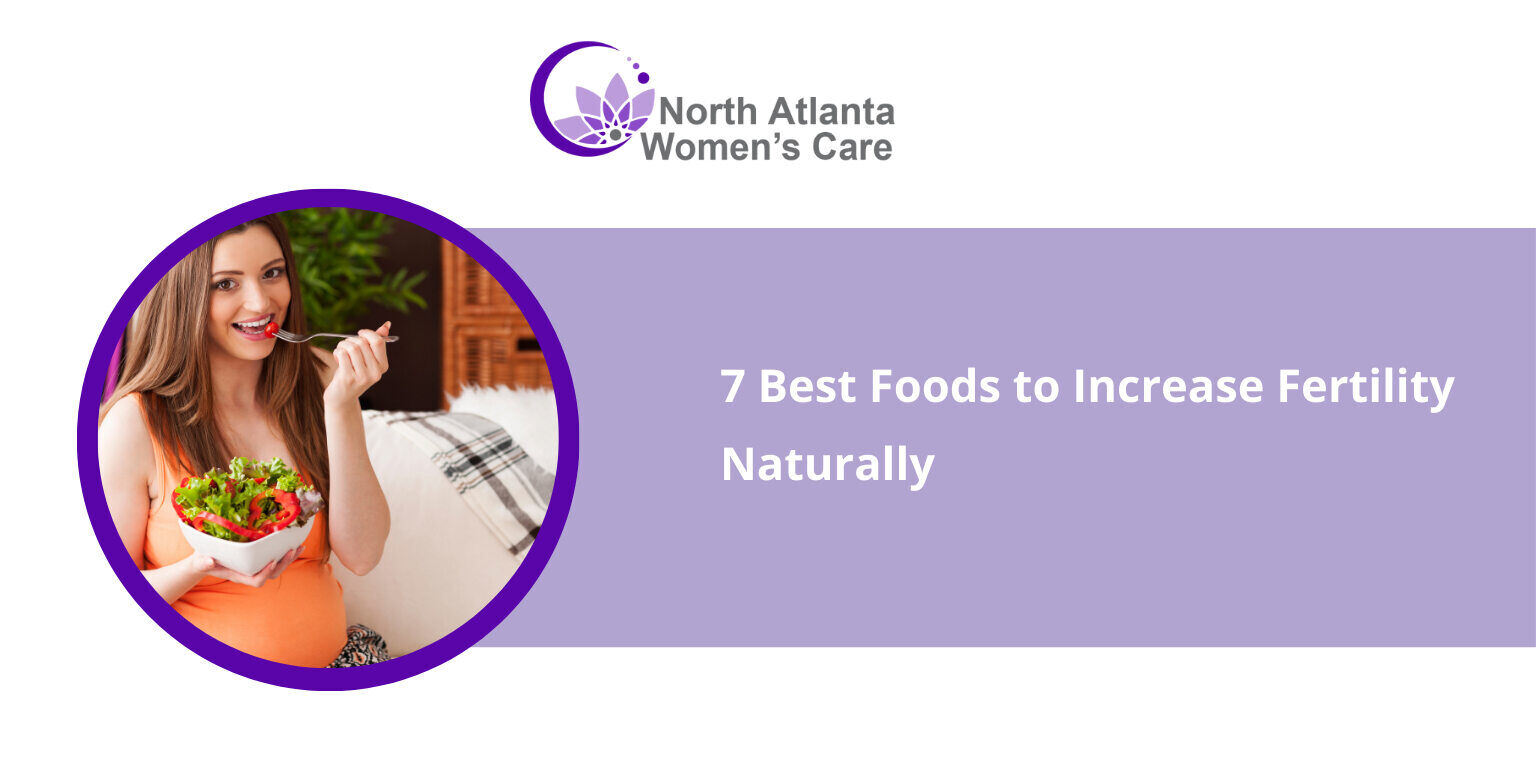7 Best Foods to Increase Fertility Naturally

Do you know? According to the CDC, about 19% of women between the ages of 15 and 49 face difficulties getting pregnant. Fertility refers to the ability to conceive and bear children. Several factors, such as hormonal imbalances, lifestyle, and nutrition, can affect a woman’s fertility.
Nutrition and an optimal diet are essential to improve and maintain fertility in biological women. The right diet can positively influence reproductive health, preparing the body for conception and supporting healthy pregnancies. In this blog, we will focus on the seven best foods to increase fertility. However, first, we must understand the term infertility.
What Is Infertility?
Infertility in women is defined as the inability to conceive after trying for at least 12 months through unprotected intercourse. This can be due to various aspects, ranging from ovulatory disorders to underlying medical conditions. In some cases, the cause of infertility is unknown. However, there are common signs of infertility in women that may indicate a problem with reproductive health:
- Irregular or absent menstrual periods: Irregular cycles can signal ovulatory issues, which may prevent pregnancy.
- Hormonal imbalances: Symptoms like sudden weight gain or loss, excessive facial or body hair, and severe acne can suggest hormonal problems.
- Pain during intercourse or menstruation: Conditions like endometriosis or fibroids can cause pain, which may interfere with conception.
- Recurrent miscarriages: Women who experience multiple miscarriages may have an underlying issue affecting their ability to sustain a pregnancy.
If you experience any of these symptoms, it’s essential to consult with a healthcare professional. While infertility can be caused by various causes, adopting a fertility-focused diet is one way to naturally support reproductive health.
How Does Diet Impact Fertility?
Nutrition has a direct impact on reproductive health. The food we consume can either nourish our bodies and create an appropriate environment for conception or hinder the process. Here’s how diet affects fertility:
- Hormone regulation: A balanced diet helps maintain healthy hormone levels, which are essential for ovulation.
- Egg quality: Nutrient-rich foods support the development of healthy eggs, improving the chances of conception.
- Improved reproductive health: A proper diet creates an optimal environment for conception by promoting overall well-being.
By focusing on a diet that supports these functions, you can naturally improve your fertility. Let’s see seven nutrient-rich foods that can help increase fertility and improve the chances of conception.
Seven Foods that Can Help You Get Pregnant
- Whole Grains: Brown rice, quinoa, and whole wheat bread are excellent sources of fiber and complex carbohydrates. These foods help regulate blood sugar and insulin levels, which is essential for maintaining a hormonal balance. Insulin resistance, often caused by a diet high in refined carbohydrates, can interfere with ovulation and increase the risk of infertility. Including whole grains in your diet provides sustained energy while supporting your reproductive health.
- Leafy Greens: Spinach, kale, and romaine lettuce are loaded with folate, a B vitamin necessary for cell development and egg health. Folate also helps prevent birth defects in early pregnancy, making it an essential nutrient for women trying to conceive. Leafy greens are easy to incorporate into your diet, whether in salads, smoothies, or as side dishes.
- Berries: Blueberries, raspberries, and strawberries are high in antioxidants that protect reproductive cells from oxidative stress. The antioxidants found in berries are known to improve egg and sperm quality by preventing cellular damage. These fruits are also low in sugar and high in fiber, making them a nutritious choice for fertility-focused diets.
- Nuts and Seeds: Almonds, walnuts, chia seeds, and flaxseeds are rich in essential fatty acids like omega-3s. These fats help regulate hormones and promote healthy reproductive function. Additionally, nuts and seeds provide vitamin E, a powerful antioxidant that protects the reproductive organs from free radical damage. Incorporating a handful of nuts or adding seeds to your meals can easily boost your intake of these fertility-supporting nutrients.
- Fatty Fish: Salmon, mackerel, and sardines are excellent sources of omega-3 fatty acids. Omega-3s support hormone regulation, improve blood flow to the reproductive organs, and boost egg quality. Additionally, the healthy fats found in fish contribute to overall heart health, which is beneficial for pregnancy. Aim to include fatty fish in your diet at least twice a week for optimal fertility support.
- Avocados: These are packed with healthy fats, potassium, and vitamins that support hormonal balance and reproductive health. The monounsaturated fats in avocados help regulate blood sugar and improve egg quality. Avocados are versatile and can be added to salads, toast, smoothies, or enjoyed on their own as a snack.
- Dark Chocolate: Dark chocolate, especially with high cocoa content (70% or more), is rich in antioxidants that improve blood flow and support reproductive health. The flavonoids in dark chocolate have been shown to reduce stress and inflammation, which can improve fertility. Enjoying a small piece of dark chocolate can provide health benefits while satisfying your sweet tooth.
The Right Diet Can Help Support Fertility and Pregnancy
Boosting fertility naturally through diet is a proactive step toward achieving a healthy pregnancy. You must incorporate nutrient-dense foods like whole grains, leafy greens, berries, nuts, seeds, fatty fish, avocados, and dark chocolate into your daily meals to improve your reproductive health. These small yet powerful changes, combined with a healthy lifestyle, can make a major difference in your fertility journey.
North Atlanta Women’s Care: A Compassionate Approach to Comprehensive Treatment
At North Atlanta Women’s Care, we understand the emotional and psychological impact of facing infertility. Our compassionate team works with you to find the root cause of your struggle and treat it following a multifaceted approach, from medication to assisted reproductive technology. Request an appointment with us to learn more.
Comments are closed

